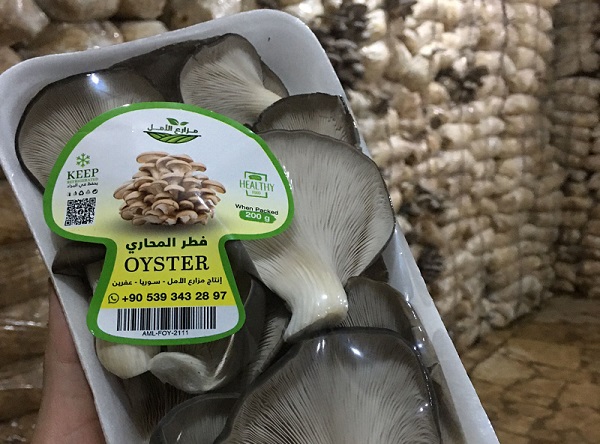Relying on his own efforts, with modest equipment and humble costs, Mahmoud Jouha succeeded in cultivating domestic mushroom in the opposition-held region of Afrin, northwest of Aleppo, defying displacement hardships and making good income.
Like hundreds of thousands of Syrian displaced, Jouha sought to rehabilitate after leaving Ghouta suburbs in the eastern enclave of Damascus.
Now his project is providing new living income for him and his family and other six workers, he told Zaman Al-Wasl.
‘Farms of Hope’ startup, which is based on an area of 400 square meters, produces 300 kg per week of various types and colors of mushrooms, covering about 5 percent of the needs of the local market in Afrin.
Jouha began his first steps in mushroom farming during the siege of the eastern Ghouta suburbs five years ago. He received extensive training courses organized by the Nawat Center for Scientific Studies.
Jouha sells his mushrooms in the main marketplace of Afrin as well as for loyal customers whose price ranges between 18-20 Turkish lira per kilogram (About $1.5). Northwestern Syria is home to 3.5 million refugees but is controlled by Turkish-backed factions.
The mushroom cultivation project is not without some inconveniences such as lack of liquidity, lack of space and the need for a wider place to increase production in proportion to the market need. Jouha seeks to obtain an appropriate financing or entering into a specific partnership will provide us with better equipment to increase production and employ more people in the future, he told Zaman al-Wasl.
Jouha's successful project encouraged fellow displaced to launch similar projects also he says some entrepreneurs contacted him from Jordan and Lebanon.

The process of mushroom cultivation is based on the presence of two basic materials, straw and seed, in addition to the availability of water, while the project produces 7 different types of mushroom, most notably oyster mushrooms, according to the needs of customers.
After that, mushroom seeds are sprinkled over the pasteurized hay in certain quantities, mixed and packed with specific weights inside plastics bags, after which they are placed again in plastic cages to provide additional space for cultivation, and then they are perforated and placed in a closed room that does not enter the sun or insects, and it is The humidity in it is from 80-90 hygrometers, and the temperature is in the range of 23 degrees Celsius, in order for the mushrooms to germinate.
The incubation period for mushroom tissues takes 21 days, after which the bags are transferred to the fruiting room. Jouha explained that at this stage, the bags must be exposed to light and sprayed with a small amount of water at a rate of 6 times a day, and after three days, the mushrooms will begin to appear and grow, to begin the stage of picking after about 10 days.
The Syrian conflict has claimed 494,438 lives and has displaced 13,2 million people since it erupted in March 2011 with the brutal repression of anti-regime protests.
Zaman Al Wasl
















Comments About This Article
Please fill the fields below.